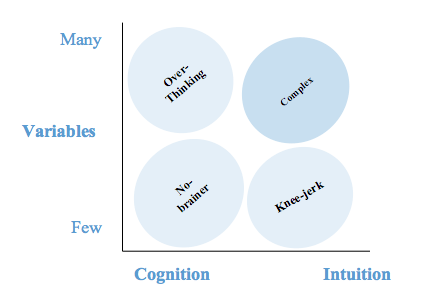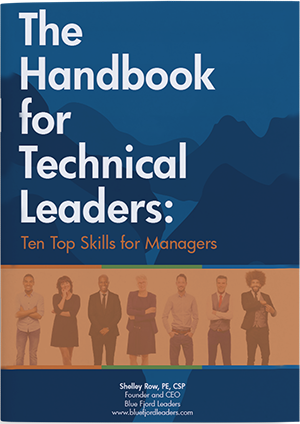 Are you in a management or leadership position? Or, perhaps you moved from a specific technical position into a management or a leadership position. If so, you know that the higher you move in an organization, the more you experience increasingly complex decisions. You have a choice about how to process information and make decisions.
Are you in a management or leadership position? Or, perhaps you moved from a specific technical position into a management or a leadership position. If so, you know that the higher you move in an organization, the more you experience increasingly complex decisions. You have a choice about how to process information and make decisions.
Interviews of more than 70 leaders resulted in a decision-making framework with four types of leadership decision-making styles. Each of the four are a combination of cognitive and intuitive processing: No-brainer decisions, over-thinking, knee-jerk and complex decisions. We use them all but successful leaders know to navigate between them based on the circumstances, context and feelings.
No-Brainer decisions are highly quantitative, fact-based, have well-defined boundaries, low risk and emotion, or a clear definition of success. This type of decision may be defined and delegated. Simple decisions are comfortably be made using predominantly cognitive processing. You are using no-brainer decision-making if:
- Facts and analysis are the main determinant
- Rules, laws, processes and procedures are definitive
- An over-riding principle (like safety) is at stake
- There is little controversy or emotion
- The risk is low
Over-thinking is common because we learned to value logical thought to the exclusion of everything else. You may find yourself force-fitting every decision into a logical mold by rationalizing decisions or creating pro/con lists. Over-thinking is repetitive cognitive processing in search of a logical resolution. You may feel stuck as you chew on a decision longer than warranted. You are using over-thinking if:
- Data and analysis shut out other considerations
- Processes and procedures are stretched to fit
- The decision is postponed while seeking more information
- The time spent in decision-making exceeds the value of the decision
- Nagging feelings are shoved aside to “think it through”
Knee-jerk decision-makers make decisions without considering all available information. They “shoot from the hip.” Everyone makes knee-jerk decisions occasionally. The challenge is to understand the motivation. Knee-jerk decisions come from deeply ingrained habits from life professional experience. They can also be reactions triggered at an emotional level. You need to know the difference. You are using knee-jerk decision-making if:
- There is quick reaction without hearing available information
- You over-react to a situation
- Your reaction causes later regret about how the decision was handled
- There is strong emotion behind the decision
- Available information and others’ input are discounted
Complex decisions involve high degrees of uncertainty and ambiguity. Decisions involving many people with high emotion are complex. These are decisions with no clear definition of success or where conflicting principles are at play. Periods of rapid change or crisis also breed complexity. The more complexity, the less likely cognition alone will provide a sound resolution. Intuitive processing is more effective at combining many variables into an insightful decision that may seem at odds with logic. You are using complex decision-making if:
- Perceptions from impacted people are considered
- The objective of the decision is separated from extraneous information
- The context of the decision is accounted for
- Feelings about the decision are acknowledged
- Your final decision is guided by an informed knowing
Leadership positions embody complex decision-making. Leaders must embrace both cognition and intuition. Everyone has both, but not everyone uses both. Are you?






0 Comments